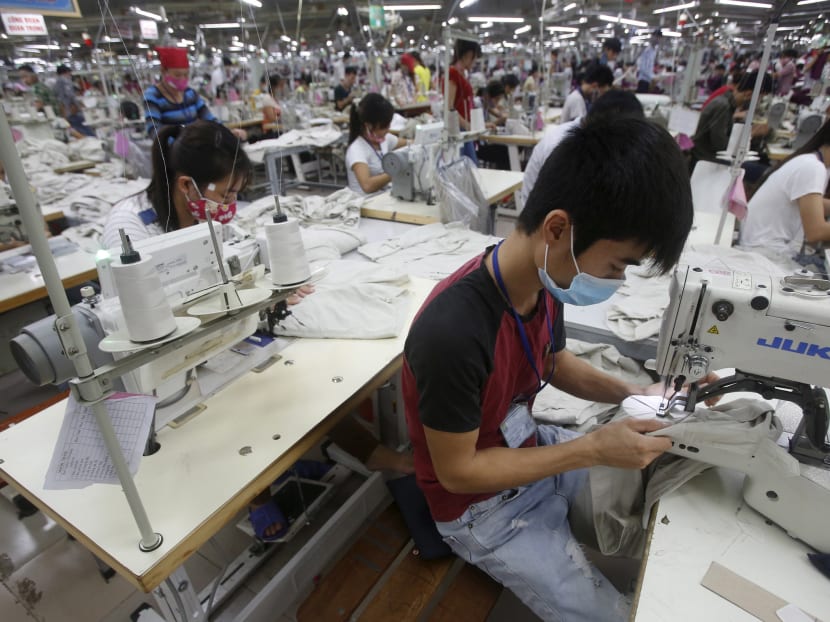S’pore businesses sharpen Asean focus amid Brexit uncertainty
SINGAPORE — Following Britain’s vote last month to leave the European Union, Singapore businesses are sharpening their focus on emerging and immediate opportunities in the Association of South-east Asian Nations (Asean), given the uncertainty looming large over the United Kingdom and European markets, said the head of the Singapore Business Federation (SBF) on Thursday (July 14).

A garment factory in Bac Giang province, near Hanoi, Vietnam. Singapore investors are focusing on Vietnam in the area of manufacturing, particularly textiles. Reuters file photo
SINGAPORE — Following Britain’s vote last month to leave the European Union, Singapore businesses are sharpening their focus on emerging and immediate opportunities in the Association of South-east Asian Nations (Asean), given the uncertainty looming large over the United Kingdom and European markets, said the head of the Singapore Business Federation (SBF) on Thursday (July 14).
“The focus has always been there but the uncertainties created by Brexit in the UK and Europe make it even more pressing to look back more aggressively at Asia and Asean in particular. So, in terms of strategy, businesses are saying that it is better to look at Asean for immediate investment opportunities as it is lot more certain,” Mr Ho Meng Kit, CEO of the Republic’s apex business chamber, told TODAY.
For Asean to develop stronger roots, regional integration is even more important as a result of Brexit, he said. Intra-government capacity and infrastructure building is key, as well as awareness creation and facilitation for small- and medium-sized enterprises to reap the benefits of Asean integration, he added.
Singapore investors are now looking more aggressively at immediate opportunities in Myanmar in the space of education, training, property development, industrial parks, infrastructure and master planning besides building and construction, said Mr Ho. SBF will soon be leading a contingent of 25 companies to Myanmar for an exhibition there on manpower training, skills development and education.
Vietnam is the other focus market for Singapore investors in the area of manufacturing, particularly textiles. “Singapore manufacturers are looking at pooling more investments into Vietnam as the country is poised to be one of the top beneficiaries from the Trans-Pacific Partnership (TPP). It will be a large manufacturing base, particularly for textile re-export to the US market, as they have preferential treatment from TPP in terms of tariff,” said Mr Ho.
In his opening address at the forum, OCBC Bank’s Group CEO Samuel Tsien said: “An economically integrated Asean market with greater liberalisation and a more business-friendly regulatory environment will generate more trade and investment opportunities for all of us.
“Brexit does not mean that Britain disappears from the world. It continues to exist. It is only that it has to interact and engage its European partners differently. Given the depth of British market knowledge and influence, it is far too premature to write off Britain as a global economic force or, for that matter, a global financial centre.”
In a discussion on Asia’s prospects in the post-Brexit world, Dr Guan Tao, senior researcher of China Finance 40 Forum, said: “Asia must rethink monetary policy co-operation in the region … With the pound and euro being beaten, Brexit may increase the barrier for Asian companies to enter the UK and Europe, though it makes it much cheaper for them to buy assets there.”
Dr Lim Wee Chai, executive chairman of Malaysia’s Top Glove, said that events such as Brexit cause currency devaluations and payment process disruptions.
“Companies should internationalise with a focus on areas of value creation, technology and knowledge. Inefficiency is a crisis,” he said.
Separately, speaking to reporters at the event, Mr Paul Krugman, professor of Economics at the Graduate Center, City University of New York, said: “Global interdependence these days is much stronger than it used to be, not so much because of trade flows, which are large but have not grown, but because of capital markets and exchange rates. If the US goes off the deep end ... or China has a crash, it’s very difficult for anybody to insulate.”





